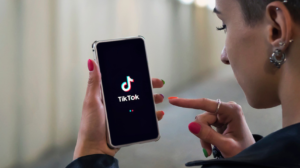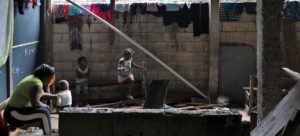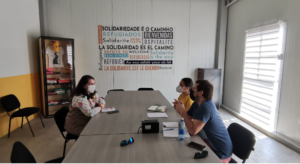As Myanmar’s civil war deepens, a year of relentless violence, dispossession, and displacement continues to devastate ethnic minorities, with the Muslim Rohingya bearing the brunt. In Rakhine State, the conflict between the military regime — the State Administration Council (SAC) — and the Arakan Army has intensified, and the SAC is deploying internet shutdowns as a weapon against civilians.
While the regime claims to target armed insurgents, these sweeping blackouts isolate entire communities. For the Rohingya, already marginalized by severe discrimination and restricted movement, the loss of communication in active conflict zones is yet another blow, compounding their vulnerability and eroding their lifeline to safety.
Civilians in many parts of Myanmar have been deprived of the internet since the 2021 coup due to blanket shutdowns and a nationwide firewall on various online platforms like Facebook, which used to be the country’s primary online space for communication.
According to Access Now, 13 out of 14 states and regions in Myanmar have been subjected to disruptions since 2021, and at least 80 townships were facingongoing internet shutdowns and phone line disconnections as of March 2024.
Internet outages significantly impact people’s everyday lives by disrupting banking services and depriving people of access to lifesaving information related to troop movements or airstrikes. However, the effects of such internet restrictions are particularly severe for Rohingya people in Rakhine State.
Impact of Statewide Shutdowns
Since November 2023, local telecommunication services have become extremely limited and, in some areas, completely unavailable in Rakhine State. In January 2024, internet shutdowns impacted every township in the state, while residents were concurrently suffering from an ongoing military blockade and travel bans. Additionally, since November 2023, the SAC has blocked all travel routes in and out of Rakhine State, leading to shortages of essential commodities like rice and medicine.
Road blockages have made delivering humanitarian aid like food and medication nearly impossible. In this context, internet and phone access disruptions have significantly impacted safety, access to information, and the ability of humanitarian responders to either transfer funds or deliver humanitarian support. Limited internet and communications and movement restrictions have also made it challenging for independent media sources to verify claims and combat disinformation during the conflict.
As those caught up in the conflict struggle without access to essential information and services, the impact of internet shutdowns becomes devastating and increasingly an issue of life and death.
Rohingya in Maungdaw and Buthidaung townships said that they did not receive any information to seek safety from indiscriminate attacks by both SAC and the United League of Arakan/Arakan Army (ULA/AA). A Rohingya from the Four Mile village said that although ULA/AA came to his Rakhine villages and asked them to evacuate to safer locations designated by the ULA/AA, they did not share any information related to potential fighting with the Rohingya villagers.

On 16 June 2024, ULA/AA issued a statement warning Maungdaw residents to evacuate the area immediately as it was planning to launch an offensive attack on SAC forces in the border town. However, Rohingyas, especially those living in remote areas, did not receive such information to evacuate from their villages or towns. They said that in some regions, ULA/AA officials came to their villages and asked them to evacuate immediately as the Arakan Army planned to attack SAC camps near the villages. Still, ULA/AA did not guide or share crucial information, such as where they had to evacuate or which areas were safe to escape.
With limited details for evacuation, thousands of Rohingya from at least 20 villages fled to where they thought they would be safe. However, they were left on the streets or in the forest without protection, shelter, or assistance. When they fled from their villages to escape the intense fighting and indiscriminate shelling by both armed groups, ULA/AA soldiers confiscated mobile phones from the Rohingyas on the way by claiming that it was a matter of security and public safety.
Rohingyas who fled to safer locations from their original villages lost communication with their family and relatives and did not know whether they survived the attack in Maungdaw and Buthidaung townships. A Rohingya from the northern part of Rakhine State who recently fled to Cox’s Bazar said:
“We did not receive any information to seek safety, and we don’t know when to leave our village or where to go. In May and June 2024, before starting intense fighting in our village, ULA/AA officials came to neighboring Rakhine villages and asked Rakhine people to leave the villages. Our religious leaders and community leaders reached out to ULA/AA soldiers about potential fighting in our village, but they did not share anything with us. Later, our village was attacked by both armed actors, and several people died and injured and the whole village also lost their properties.” – 25, Male, Cox’s Bazar
Restrictions on the Rohingya
To cope with the situation, Rohingyas living in Maungdaw, Butiduang, and Rathedaung townships along the Bangladesh-Myanmar border try to use Bangladeshi SIM cards as an alternative to access phone lines and the internet. And yet, Rohingya in those areas have reported that the Rakhine ethnic people in the border area had fewer barriers compared to Rohingyas as they had access to the Bangladeshi SIMs freely and did not face restrictions from using those SIMs by the United League of Arakan/Arakan Army.
However, ULA/AA has imposed restrictions of use only to Rohingyas and often committed confiscation of phone devices, extortion, and arrest for using Bangladeshi SIMs. This discriminatory policy further isolates the Rohingya from telecommunication services that are otherwise available for other ethnic communities living in the areas of intense fighting in the northern part of Rakhine State.

Rohingya from Buthidaung and Rathedaung townships said that in ULA/AA-controlled areas, ULA/AA assigned representatives to take charge of public phone calls and mobile phone devices. All those who want to make a phone call must approach a representative and use a public phone without privacy safeguards, while the calls are charged 500 Myanmar kyats per minute. Meanwhile, the ULA/AA monitors mobile phone devices, especially those with Bangladeshi SIM cards.
“It is not safe at all, and ULA/AA arrested Rohingya people who they accused of sharing information on social media and with the Rohingya diaspora by using BD SIM cards. People fear using phone devices and SIMs, although we can access the internet and phone lines with BD SIM cards in our areas. They appointed representatives in every Rohingya village to monitor internet use and phone line BD sim cards. No official announcement was issued by ULA/AA banning BD sim cards, but they are closely monitoring all these activities.” – 36, Male, Buthiduang
Although people in Maungdaw Township could access a limited internet connection via a Bangladeshi SIM card in a hilly area, the location later became the site of the ULA/AA camp. Fearing arbitrary arrests by the ULA/AA, the area was no longer frequented by Rohingya looking to use their mobile devices. Only a small number of Rohingya villagers who were close to ULA/AA were able to access the internet and phone lines near the hill.
Indeed, not only is the lack of information dangerous in and of itself, but illegal access to Bangladeshi SIM cards also poses a high risk for Rohingya, as both ULA/AA and SAC have restricted them. As a result, due to a lack of internet access and access to online platforms for the Rohingya, hate speech and fake news is spreading within the community, deliberately targeting the Rohingya community and intensifying intercommunal tensions between Rakhine and the Rohingya community.
“There is a lot of hate speech and fake news on social media, but we cannot properly counter them. Pro-military groups and some Rakhine extremists widely disseminate hate speech, sometimes even inciting Rakhine people to kill Rohingya.” – 28, Male, Maungdaw
Since the internet has been cut off in the Rakhine regions in the past five months, along with disruptions to trade flows, the local population has been facing a significant crisis. Still, Rohingya are more vulnerable than other ethnic groups in Rakhine State and left with no protection from both SAC and ULA/AA.
Cutting off access to communications channels removes any hope for Rohingya under attack of accessing information about possible evacuation routes or connecting with their family. Both SAC and ULA/AA implement stricter access to information and mobile phone devices to keep information and make the Rohingya more socially isolated, piling on the disproportionate impact towards the Rohingya and other marginalized communities, who struggle to access modes of communication during intense fighting in Rakhine State.
Source: https://thecontrapuntal.com/myanmars-internet-blackouts-target-rohingya/




